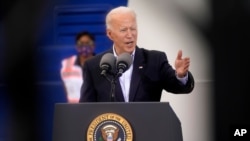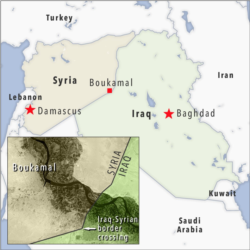U.S. President Joe Biden on Friday warned Iran to tread carefully in Iraq following a U.S. airstrike that destroyed parts of a compound used by Iranian-backed militias as they travel between Syria and Iraq.
“You can't act with impunity,” Biden told reporters in Houston, when asked what message he was trying to send Tehran by ordering the airstrike, carried out late Thursday, that hit a compound in Boukamal, on the Syrian side of the border with Iraq.
“Be careful,” he added.
The president’s comments — coming nearly 24 hours after two U.S. F-15 Eagles dropped seven precision-guided bombs, destroying nine facilities and severely damaging two others — were his first about the strike, which has become the subject of a political debate in the U.S.
Administration officials spent much of the day defending the strike, arguing it was necessary to protect American forces in the region following a series of rocket attacks, including two in the past two weeks in Irbil and Baghdad.
While the Katyusha rocket attack on Baghdad’s Green Zone caused only limited damage, the attack outside Irbil International Airport, in northern Iraq, killed a contractor for the U.S.-led coalition and injured nine others.
Some members of Biden’s own political party, however, voiced concern Friday that the president may have gone too far by ordering a retaliatory strike.
“The American people deserve to hear the administration’s rationale for these strikes and its legal justification for acting without coming to Congress,” Democratic Senator Tim Kaine, a member of both the Armed Services and Foreign Relations committees, said in a statement Friday.
“Offensive military action without congressional approval is not constitutional absent extraordinary circumstances,” he added.
Officials at the White House and the Pentagon quickly pushed back, arguing Biden was well within his rights, citing the attacks in Irbil and Baghdad while hinting more militia attacks were likely.
"When threats are posed, he has the right to take an action at the time and in the manner of his choosing,” White House press secretary Jen Psaki told reporters accompanying the president on a trip to Houston.
“The president is sending an unambiguous message that he's going to act to protect Americans,” she said, adding, "There was a thorough legal process and review in advance.”
The Pentagon on Friday said it had notified congressional leadership before the strike was launched and that a full, classified briefing was slated for the coming days.
“This really was a defensive strike meant to help protect, in the future, American forces and coalition partners,” Pentagon spokesperson John Kirby told reporters Friday.
“We're confident that these were legitimate targets,” he said. “We know that this compound was used by these groups to help resource and help facilitate their ability to conduct these kinds of attacks inside Iraq.”
In a statement late Thursday, the Pentagon said the strike targeted a compound at a checkpoint on the Syrian side of the Iraq-Syria border used by Kataeb Hezbollah (KH) and Kataeb Sayyid al-Shuhada (KSS).
Initial U.S. assessments indicated there were also some casualties, though Kirby declined to share any specifics.
“These targets were chosen carefully, very deliberately, and struck in exactly the same manner,” Kirby said.
According to the London-based Syrian Observatory for Human Rights, the U.S. airstrike targeted a weapons shipment destined for the Iranian-backed militias. Citing sources on the ground in Syria, it said 17 militia members were killed.
Kataeb Hezbollah confirmed the death of one of its fighters and condemned the U.S. action, insisting it was not involved in the recent attacks on U.S. and coalition forces in Iraq.
“We stress the legitimate right of our Iraqi people to respond to this cowardly criminal operation,” it said in a statement translated by the SITE Intelligence Group.
The group also urged Iraqis to “expel the American occupation forces and prosecute the traitors who conspire with them.”
Iraqi officials, meanwhile, denied providing the U.S. with any assistance that led to targeting the Boukamal site, insisting cooperation with Washington was limited to the fight against the Islamic State terror group.
Kirby said while Baghdad did not provide any intelligence that helped in targeting the Iran-backed militia facilities, Iraqi intelligence “was able to help us better determine who was responsible” for the rocket attacks on U.S. and coalition troops.
For its part, Iran condemned the U.S. airstrike, with Foreign Ministry spokesperson Saeed Khatibzadeh labeling it an “illegal aggression.”
Syria’s Foreign Ministry likewise chastised Washington, saying, “It [the Biden administration] is supposed to stick to international legitimacy, not to the law of the jungle as [did] the previous administration."
Whether the U.S. strike will send a message and do much to deter the Iranian-backed militias, however, remains to be seen.
“It sent the signal that Biden won't be a pushover on [Iranian] proxy activities, though the Iranians may not even register that,” said Phillip Smyth, an analyst at the Washington Institute for Near East Policy who studies Shiite militias in the region.
“It's a softer, but still a rather nuanced hit,” Smyth added of the U.S. decision to strike a target in Syria, saying the response from the militias so far had been somewhat muted.
“I get the impression it will cool down for a little bit and then possibly heat up,” he said.
VOA White House correspondent Patsy Widakuswara contributed to this report. Some information came from Reuters.






